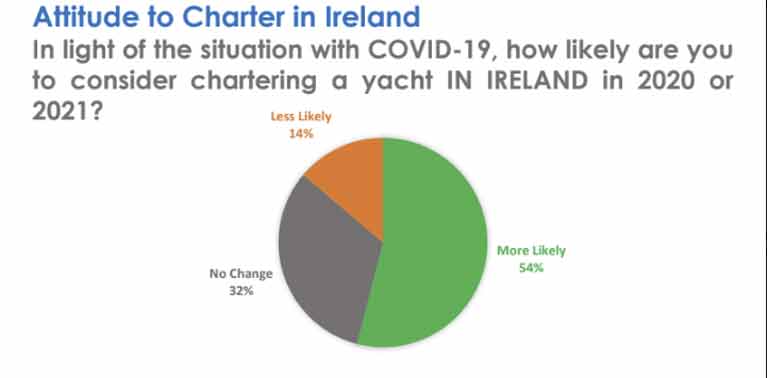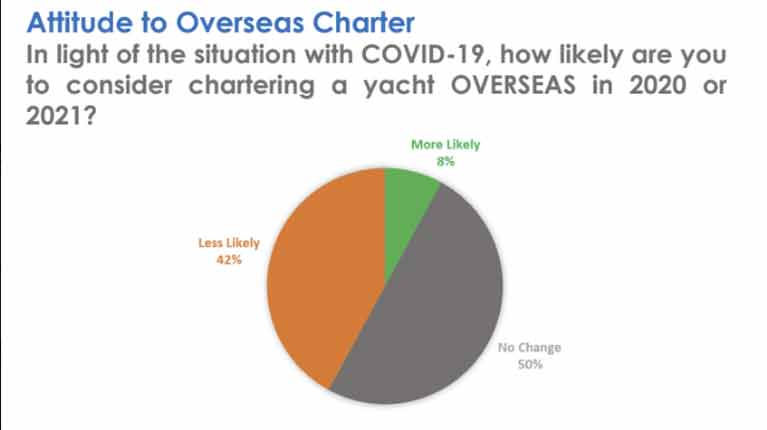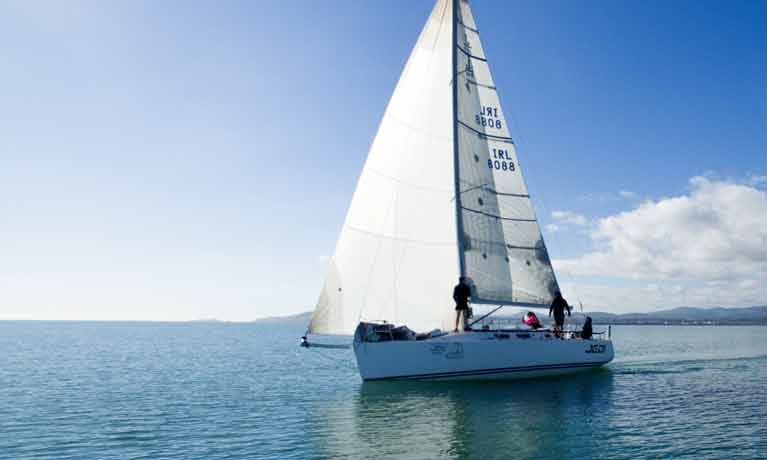There’s a demand for short term, easily available yacht charter on Irish waters, that's according to a survey conducted earlier this month by a Dun Laoghaire Harbour Sailing School.
As Afloat reported previously, the Irish National Sailing & Powerboat School in Dun Laoghaire Harbour asked those who might usually head abroad for a charter holiday what their intentions were in light of the Covid-19 epidemic.
The main aim was to see what could be done to help the domestic marine industry and get a conversation going, with actions flowing quickly.
The concept was rooted in stimulating the domestic charter market especially as family activities on a yacht may be one of the few activities that can safely get afloat this year.
Between speaking to their previous graduates from the last few years, and with help from afloat magazine data and suggestions started coming in from a very short survey.
Over 40% of respondents indicate they would be less likely to travel overseas to charter, with more than 50% indicating they would be more likely to do so in Ireland. Commenting on the figures, Communications and Marketing Manager Glyn Williams describes them as “Hardly surprising, but being able to a figure on it is great, but equally, we got plenty of insight into what barriers there are to chartering yachts, as well as some brilliant suggestions”.
What Barriers Exist for the Irish Yacht Charter Market?
The school found that the top factor considered a barrier to chartering was the value for money proposition. Equally the yacht availability, flexibility on charter duration and the clear display of this information was raised.
"Biggest barrier to chartering was the value for money proposition"
Yacht and service quality ranked next and tied into the value for money question. According to school chief instructor Kenneth Rumball, “Undoubtedly, professional management and rapid support will deal with many of these concerns, as it’s very unlikely the Irish industry would match the age and cycling of vessels in more established charter destinations”.
 (Above and below) results from the INSS Yacht Charter survey taken during the COVID-19 epidemic
(Above and below) results from the INSS Yacht Charter survey taken during the COVID-19 epidemic

Perceptions of skipper’s own knowledge gaps was the next most common concern. We’re competing against destinations with well-established routes, excellent marina networks and more importantly, no tides. The school is well placed here to help, according to Kenneth “training is our business, this is something we propose to address with short theory courses and tailored client support”.
Interestingly, the gaps in the marina network didn’t feature as a major concern according to Glyn. “There’s a demand for short term, easy entry charter. This doesn’t take away from calls for more infrastructure development around our coast but shows that we can grow this concept with what’s already available”.
By this stage of this article, you’re probably screaming at your screen “What about the weather!”. Glyn’s response, “Well, it certainly came up, but not nearly as much as you’d have guessed. Instead, it was framed in terms of value for money and what could be offered by providers to accommodate the Irish climate”.
What’s next?
When asked about developing the concept from the school’s perspective, Kenneth is optimistic. “We train about 300 yacht graduates each year, and the vast majority do the course to access the charter lifestyle. With some clever and targeted supports, we can easily convince those to holiday at home, especially when personal skills development can be listed as a benefit alongside spending time with the family, or partner”.
Rumball feels collaboration will be important. “We’ve already got a great relationship with James Lyons from Sovereign Sailing, and we’ll continue working together behind the scenes to advance the concept”. Other interested parties are invited to get in touch with the school.
Moving forward, the school is calling for interested yacht owners who may be interested in working with the school to expand the concept on the East Coast. Profit-share arrangements work elsewhere, participating owners typically cover all annual costs, from insurance, mooring fees and ongoing maintenance. Rumball characterises it as essentially free yachting for the owner and proposes a concept where the Irish National Sailing & Powerboat School would manage bookings, administration, maintenance and all the logistics. The school has already been in contact with prospective insurers and has found premiums only typically rise around 40% to cover the charter element.
Owners can contact Kenneth Rumball by email, [email protected], or call the school’s office on 01 284 4195 for more details and a full breakdown of the proposals.



























































